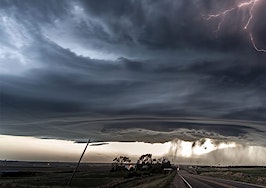- Some agents and brokers responded to President Trump's decision to pull America out of the Paris climate agreement with equanimity.
- As concern grows over rising sea levels in South Florida and other coastal cities, local government and citizens may have to step up.
- Brokerage owners in states prioritizing climate change and clean tech are looking to state leaders to show the way forward.
In what he described as a “reassertion of American sovereignty,” President Donald Trump has pulled America out of the landmark Paris climate accord, a deal that unites more than 190 countries on climate change policy. The decision drew a mixed response from the real estate industry and agents across the U.S.
As business leaders express concern that the move will make the U.S. less competitive and put the planet at risk, Trump said he was thinking of the fortunes of Detroit; Pittsburgh; Youngstown, Ohio; and the jobs saved in the oil and coal industries when he decided to break from the agreement.

Danny Hertzberg
Wary eyes are on Florida, home to six of the 10 American urban centers most vulnerable to storm surge, and where Zillow estimates $400 billion in current housing value could be at risk by 2100 if sea levels continue to rise at their current pace.
Danny Hertzberg from The Jills Team, Coldwell Banker’s no. 1 team in Miami, said that while some buyers might mention rising sea levels, it wasn’t yet their no. 1, 2 or 3 concern, and some of the most expensive areas exposed to sea level rise were still seeing huge demand for waterfront homes.
The city has been building higher sea walls and has invested $60 million in construction to raise streets, he said. Moreover, with the strong dollar, the team expected investors to continue seeing the U.S. as a safe haven.
Olivier Grinda, the CEO of Miami-based brokerage, Home61 added: “Sea level rise is definitely a growing concern in Miami as well as most of Florida; however, the effects of Trump’s withdrawal from the Paris accord are seen as long term and not those of urgent action from the market.

Olivier Grinda
“Perhaps the implications of the President’s decision will create more concern for local government and citizens to take action against global warming effects here in our backyard, but we don’t foresee the real estate market being affected negatively in the near future.”
Clean energy and bio tech: 1,000-ton freight trains moving fast
Up the coast, Cody Vichinsky, co-founder of Hamptons luxury brokerage, Bespoke Real Estate, was sanguine about the latest decision by President Trump.

Cody Vichinsky
“It may cause equity markets to move, but my assumption is it will all be short term,” he said. Middle America manufacturing markets might see it as a positive, and those real estate markets might improve in the immediate future, he added.
But the trend toward clean energy and bio tech are 1,000-ton freight trains, Vichinsky added. “They are only picking up more speed,” he said. “It can be very difficult to stop it whether you believe in science or not.”

Leslie Ebersole, Baird & Warner
Of President Trump, he said: “He is a real estate guy deep down in his bones. He plays to the masses a lot, but he’s also savvy about what it will do to his own portfolios and to the portfolios of his cohorts.”
Chicago-based Baird & Warner broker Leslie Ebersole pointed to the online conversation happening among top business execs. “Twitter has been interesting. Criticisms from corporate CEOs like GE, GM and Goldman Sachs — saying this is bad for the economy and will cost jobs,” she said. “That can’t be good — these people are Trump’s billionaire buddies.”
Disappointed with today’s decision on the Paris Agreement. Climate change is real. Industry must now lead and not depend on government.
— Jeff Immelt (@JeffImmelt) June 1, 2017
An Alaska-based agent’s view: EPA federal overreach
Real estate leaders from Alaska and Texas were positive about the move.
Wes Madden, CEO of Madden Real Estate, part of the Keller Williams Alaska Group, said: “I would say the decision would probably be viewed favorably, overall, as it would be an indication of the future direction of the EPA and it’s role in Alaska.

Wes Madden
“Many in Alaska are impacted by climate change, but the state, which is in a recession due to the price of oil, has seen federal overreach via the EPA, which has stymied natural resource development throughout the state in both the mining and oil and gas sectors.”
Because of the federal ownership of subsurface mineral rights, Alaska has become a battleground for Washington’s policies, according to Madden. “I have to move the folks out of state when we falter, so I get an earful — let me tell you,” he said.
Founder of Texas-based brokerage JP and Associates Realtors, JP Piccinini, welcomed Trump’s decision.
“I believe this administration intends to follow the same pro-business platform that our great state of Texas has been

JP Piccinini
practicing for decades now,” he said. “Our leadership understands what’s good for business is good for our markets and that all translates in wealth for the American people.
“It’s been working for Texas. I hope the rest will understand this concept and stop taking a page out of failed European economics which have over the centuries only proven to have made the rich, richer and the poor, poorer.”
Piccinini anticipated “an assured positive impact on much of the greater Houston market and Permian basin,” where the local economy is highly susceptible to the energy sector.
Strong climate change states will continue on their own
Brokerage owners in states that pride themselves on their progressive attitudes toward climate change and clean tech are looking to state leaders to show the way forward.

Alan Mark
Alan Mark, president of The Mark Company, part of Pacific Union International, said: “(Governor) Jerry Brown … has taken the lead role in the U.S. in improving the environment and in thwarting climate change. With a population of 40 million, being the sixth largest economy in the world, the Bay Area’s focus on technology, and with most U.S. CEOs supporting the Paris accord, we’ll continue to lead the charge.
“The consumer demand will continue to grow for fuel efficient cars, whether electric or self-driving.”
Of Chinese investors who come to the West Coast for its clean air and good schools, Mark said: “They will still covet our clean air, private schools, colleges and business environment.”
Matt Beall, owner of Hawaii Life, said the president’s decision just made the natural resources of Hawaii and its real estate more valuable.

Matt Beall
“Hawaii is quickly becoming a global leader in a wide of variety of environmental policies, from alternative energy to sustainable land use and conservation,” he said.
“As those values and initiatives take hold in Hawaii, we become … a beacon of hope for our planet that is so obviously facing extreme environmental issues.
“Consequently, Hawaii becomes valuable, both to those of us who live here, but also to anyone with the means to buy property here. We, in Hawaii, are then tasked with how best to handle intense demand for Hawaii’s real estate from all over the globe.”

Ashley Bowers
“Anytime an administration makes significant policy changes, every sector, including the housing and real estate market, assesses how it might get impacted. We always encourage agents to stay focused on their day-to-day business,” added Ashley Bowers, president of HomeSmart International, a franchisor based in Scottsdale, Arizona, with a presence in 16 states. “Right now, that day-to-day means working with consumers who have continued interest in energy efficiency and smart home technology. We don’t expect that interest to change, primarily because of the cost-saving benefits to those consumers.”
It will be years before the U.S. exit from the complex Paris climate agreement, originally signed in 2015, becomes official, and Trump said he was open to renegotiating terms of the deal.












